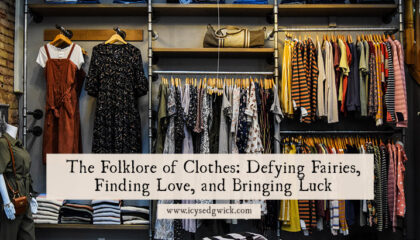You wouldn’t think something as humble as bread would have so much folklore attached to it. Yet many of us encounter bread folklore when we’re young. I’m sure we’ve all heard the old wives’ tale that eating your bread crusts would make your hair curly. My primary school had a particularly draconic dinner lady whose […]
Outerwear and Underwear: Folklore, Superstitions, and Lucky Pants
Clothing, by and large, provides a form of extra protection for the body. Outerwear can give us extra warmth, or prevent clothes underneath from being soaked through in wet weather. Underwear can also provide an extra layer, helping to trap warm air between layers. It also stops your other clothes from rubbing or irritating the […]
The Folklore of Hats, Gloves and Belts: Wear Your Own Luck
One of the ways through which we can see the changes of fashion is our approach to accessories. Yep, we still wear gloves and hats in winter, but they’re of a very different style to earlier periods. Few people still wear hats as a habitual part of an outfit, and when was the last time […]
The Folklore of Clothes: Defying Fairies, Finding Love, and Bringing Luck
Clothing is an intrinsic part of being human, letting us express who we are, what groups we belong to, what jobs we do, and so on. Clothes let us live in specific environments, providing warmth or cooling, depending on where we are. Apart from a few exceptions, it’s also part of our everyday routine. It’s […]
The Folklore of Footwear: Shoes, Boots & Stockings
Footwear appears in a range of folklore and makes a memorable appearance is a series of fairy tales. Just look at the Seven League Boots or Cinderella’s glass slipper. But it turns out that it’s more than just a plot device when it comes to folklore. A whole range of superstitions and practices see footwear […]
Royal Witches: 15th Century Women Fall Foul of Political Shenanigans
When you think of witchcraft in earlier centuries, you probably think of stereotypically wizened women, huddled around cauldrons or casting curses. You probably wouldn’t immediately think of royal witches. Yet within the space of a single century, there were four women in England’s royal family that fell prey to witchcraft accusations. Whether they actually practiced […]











